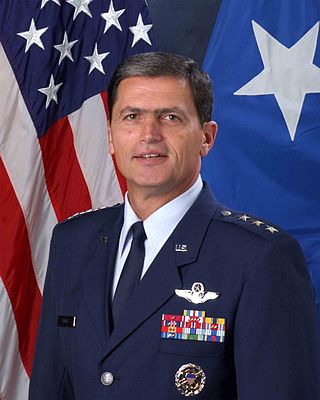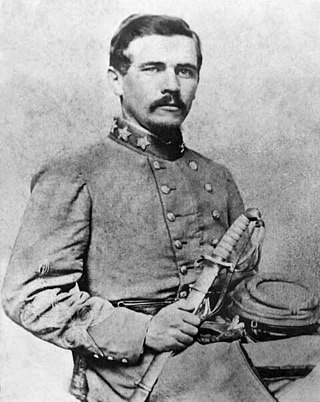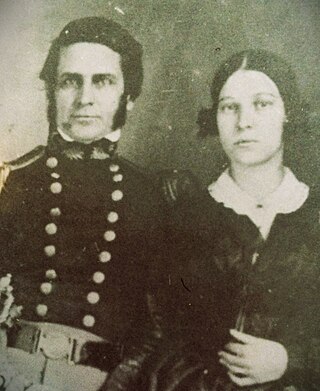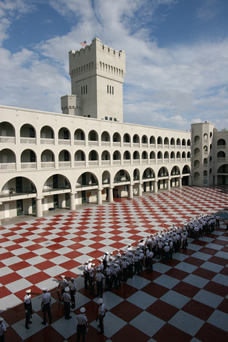
York is a city in and county seat of York County, South Carolina, United States. The population was approximately 6,985 at the 2000 census and up to 7,736 at the 2010 census. York is located approximately 27 miles (43 km) southwest of Charlotte, North Carolina and 13 miles (21 km) west of Rock Hill, South Carolina.

The Citadel Military College of South Carolina is a public senior military college in Charleston, South Carolina, United States. Established in 1842, it is the third oldest of the six senior military colleges in the United States. The Citadel was initially established as two schools to educate young men from around the state, while simultaneously protecting the South Carolina State Arsenals in both Columbia and Charleston.

Star of the West was an American merchant steamship that was launched in 1852 and scuttled by Confederate forces in 1863. In January 1861, the ship was hired by the government of the United States to transport military supplies and reinforcements to the U.S. military garrison of Fort Sumter. A battery on Morris Island, South Carolina handled by cadets from the South Carolina Military Academy fired upon the ship, considered by some scholars to have been effectively the first shots fired in the American Civil War.

John William Rosa Jr. is a retired United States Air Force Lieutenant General who served as President of his alma mater The Citadel in Charleston, South Carolina from 2006 to 2018. While on active duty, Rosa also served as the sixteenth Superintendent of the United States Air Force Academy.

Hugh Smith Thompson was the 81st governor of South Carolina, from 1882 to 1886.

Micah Jenkins was a Confederate general in the American Civil War, mortally wounded by friendly fire at the Battle of the Wilderness.

Ellison Capers was a Confederate general in the American Civil War, theologian, college professor and administrator from South Carolina.
The South Carolina Military Academy was a predecessor, two-campus institution to The Citadel. It was established in 1842 by the South Carolina Legislature and classes began at the Arsenal (Columbia) in 1843. South Carolina had constructed a series of arsenals around the state after the Denmark Vesey planned slave revolt of 1822; these were consolidated into Columbia and Charleston arsenals. No longer seen as militarily necessary, they became in 1842 the South Carolina Military Academy, consisting of the Arsenal Academy in Columbia and the Citadel Academy in Charleston. During the Civil War students from both served as the Battalion of State Cadets; SCMA cadets were among the battalion which fired the first shots of the Civil War on January 9, 1861 while manning a gun emplacement on Morris Island, South Carolina which shelled the Union steamship Star of the West; the Battalion of State Cadets made up over a third of a Confederate force that defended a strategic rail bridge in the Battle of Tulifinny in 1864. The Arsenal Academy was burned by Union troops in 1865 and never reopened; the only surviving building became the South Carolina Governor's Mansion. The Citadel Academy and the South Carolina Military Academy closed in 1865; its buildings were in Federal hands until 1882. An 1882 act of the South Carolina Legislature reopened the South Carolina Military Academy, using only the campus in Charleston. Known commonly as The Citadel Academy, the school was renamed in 1910 as The Citadel, after the name "Academy" became common to high schools rather than colleges. The school was moved to its current location in the 1960s.

Richard Woodward Colcock was the second Superintendent of the South Carolina Military Academy from 1844 through 1852.
George Calvin Rogers Sr. was an American football and baseball coach. He was the sixth head football coach at The Citadel, serving for four seasons, from 1913 to 1915 and again in 1919, compiling a record of 14–16–3. He also served as head baseball coach in 1914 and 1915 and resumed the position from 1921 through 1924.

The Battle of Tulifinny was a military engagement of the American Civil War that was fought from December 6–9, 1864 in Jasper County, South Carolina during Sherman's March to the Sea. Outnumbered five-to-one, a Confederate force led by Major-General Samuel Jones, consisting in part of the entire cadet corps of the South Carolina Military Academy, successfully defended a strategically important section of the Charleston and Savannah Railway from attacks by Union forces. The engagement was one of the rare occasions when the United States Marine Corps fought in combat during the conflict and was also the only occasion that the entire student body of a U.S. college fought in combat.
North Carolina Military Institute was established in 1858. Daniel Harvey Hill was made superintendent of the school in 1859 and James H. Lane taught natural philosophy (physics) at the Institute until the start of the U.S. Civil War. The school was later used by Charlotte Military Academy, which architect Herbert B. Hunter (1890–1976) attended. The school building stood at East Morehead and South Boulevard in Charlotte, North Carolina.

The History of The Citadel began in the early 1820s with the formation of a militia and state arsenal in response to an alleged slave revolt in 1822. By 1842 the arsenal grew into an academy, with the Legislature establishing it as the South Carolina Military Academy. Cadets played a key role in the Civil War, by assisting in the battalion firing upon a federal ship three months before the war began. Many Confederate officers attended the school. Renamed in 1910 as The Citadel, the school's academic reputation grew. After moving the campus near Hampton Park in 1922, the college has grown substantially. Sixteen years after legal segregation ended in public schools, the Citadel saw the graduation of its first Black student, Charles D. Foster, in 1970. The first woman to graduate from The Citadel, Maxine Hudson, received her degree from the graduate program in 1969. Maxine was a distinguished and beloved teacher in Charleston for over 50 years. After a rocky journey, The Citadel graduated its first female Cadet from the Corps of Cadets program at the school, future congresswoman Nancy Mace, in 1999. The school has produced many military officers, business, and political leaders throughout its history.

The 127th New York Infantry Regiment was an infantry regiment in the Union Army during the American Civil War.

Peter Fayssoux Stevens was an American soldier, educator and clergyman. He was an officer in the Confederate States Army and a bishop in the Reformed Episcopal Church who also served as 4th superintendent of the South Carolina Military Academy.

Colonel John Peyre Thomas Sr. was an educator, politician and historian who served as 6th Superintendent of the South Carolina Military Academy.
Colonel Oliver James Bond, South Carolina Militia was an American educator and college administrator who served as both Superintendent and President of The Citadel from 1908 to 1931.

Matilda Bradford "Tillie" Ehringhaus was an American civic leader who, as the wife of John C. B. Ehringhaus, served as First Lady of North Carolina from 1933 to 1937. Since her time in the North Carolina Executive Mansion was marked by the Great Depression, she made budget cuts and adaptations around the mansion to save money for the state, including having the wattage of the chandeliers lowered so that the electric bill would not exceed monthly expenses. As first lady, she hosted musical salons and was noted for her beauty and charm. After her husband's death, Ehringhaus co-edited the North Carolina Almanac and State Industrial Guide and, in 1952, served as an alternate delegate to the Democratic National Convention.

James Drayton Nance (1837-1864) was a Confederate Colonel of the American Civil War. He was known for commanding the 3rd South Carolina Infantry Regiment throughout the war, primarily serving in the Peninsula campaign, the Maryland campaign and the Gettysburg campaign but was killed at the Battle of the Wilderness.















